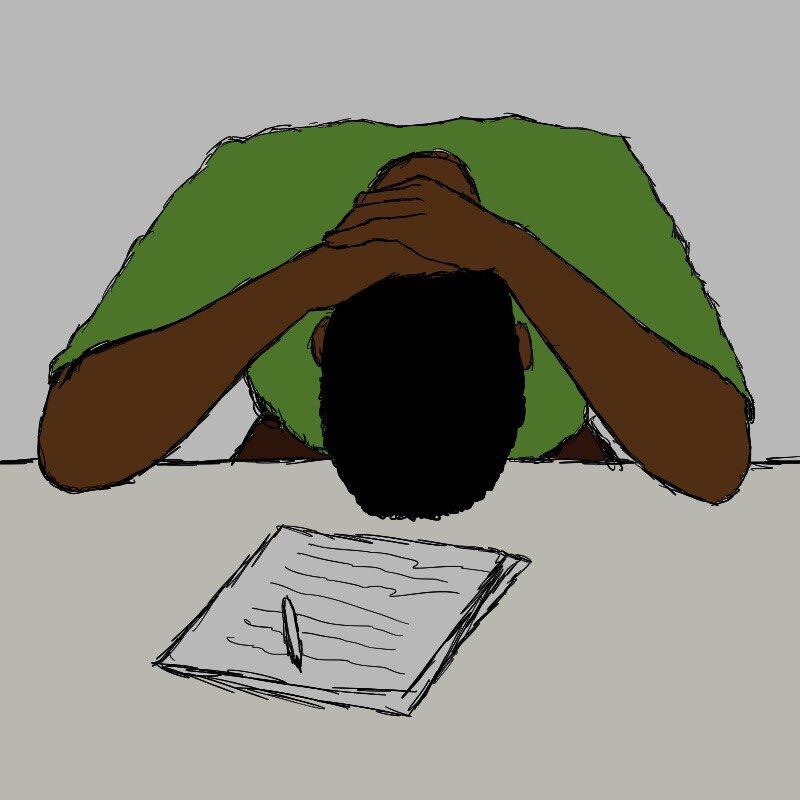Opinion | Write something that sucks — it’s good for you
April 11, 2023
Last week, I attempted to get some work done early by writing a poem for one of my creative writing classes. Foolishly, I forgot that any attempt to complete my work more than a few hours before it’s due locks me into a bizarre perfectionist mindset, from which an impending deadline is the only escape.
I opened a new document, titled it “Miscellaneous poem” — my first mistake was not even having a real idea of what to write about — and got to work. I spent the subsequent three full hours periodically writing a couplet, then deleting it seconds later.
I created a blank document at 10 p.m., and I closed the same blank document at 1 a.m.
Like many creative writers, I am very self-critical when it comes to first drafts. A lot of writers’ solution to this is the same as mine — wait for the pressure to build up, and eventually that due date will wring something out of your seemingly empty brain.
But we all know it’s not some mysterious force that takes the wheel when things get stressful. The deadline only forces you to do what you should have done from the very beginning — put shit on the page without worrying about if it’s great.
As the clock approaches 11:59 p.m. the night a paper is due, the mindset of many students gradually shifts away from “I’ve gotta make sure this one is really good” into a more realistic “I’ve gotta make sure I just have something to turn in.” Thus, the anxious student grabs hold of any passing thought vaguely related to their topic and haphazardly slaps it on the page.
A lot of the time, you’ll surprise yourself with something better than the perfect draft you imagined a blurry outline of. By spewing out whatever fragment of a sentence happens to grace your train of thought, you can keep track of ideas that you may have otherwise discarded in the pursuit of perfection.
The strategy of borderline word vomiting onto the document also ensures the paper reflects your own voice and experiences.
I find that when I have time to worry about writing something perfect on the first draft, I get far too caught up in reaching a standard set by my muses. My three-hour spell of writer’s block, while mostly spent staring at a white screen in the dark, was interspersed with periods of reading other people’s poetry for inspiration.
Horrible mistake — find your inspiration before you start writing and then kick it to the curb.
One of my favorite poets is Richard Siken, and each time I settle in to finally write a few stanzas for my class, I often so desperately want to replicate the language and emotion of poems like “Little Beast” or “A Primer for the Small Weird Loves.” If I try too hard, I get caught up in it, and on those nights I usually go to sleep with nothing to show for those last few hours before bed.
Writing creative works with a muse in mind is very difficult. While it would be so easy to just transplant their words directly into your piece, you still have to write something fundamentally different. This is exactly why writing down whatever pops into your head works.
I am never going to write a poem like Siken, not because I can’t — well, maybe because I can’t — but because I shouldn’t. If someone wanted to read a poem that sounds like Siken, they would just read a poem by Siken.
None of us should be writing to make imperfect copies of our muses — that’s what AI is for. Your “imperfect” first drafts will be the most personal version of the piece, and many would argue that’s the most important part of writing — having a voice.
I can’t promise it will make you less self-critical — even writing this column I can’t help but rip apart each paragraph. My brain fabricates voices of “Does it sound too faux-edgy to say ‘shit’ in the column?” or “Is making fun of AI overdone at this point?” or “Dude, cool it with the em dashes.”
The key is saving the self-criticism until after all the words are on the page. No matter how cringey or clunky your words may seem, they can always be taken out or cleaned up. In my experience, it’s far easier to reorganize ideas that are already there than to try and summon new sentences from the ether to fit perfectly into a revised draft.
Many writers may have already heard this advice, but the hardest part is learning to accept it. I’ve wasted far too much time meticulously crafting each and every word in my first draft.
The funny thing is that I’ve ended up liking my final pieces that began as borderline streams of consciousness far more than the ones I tried to make perfect on the first go. Most of the latter now boast file names like “Unused Writing Assignment #4.”
The first draft should be messy — perhaps even make you question if all of those words you wrote are real ones. Let it take you on strange tangents and long sentences that seem to run on and on and on. You can fix all of that up later.
Don’t sit idly in front of your computer, watching the cursor blink in and out of existence for three hours, waiting for the next great American novel to write itself on the first try.
Thomas Riley primarily writes social satire and stories about politics and philosophy. Write to them at [email protected]




